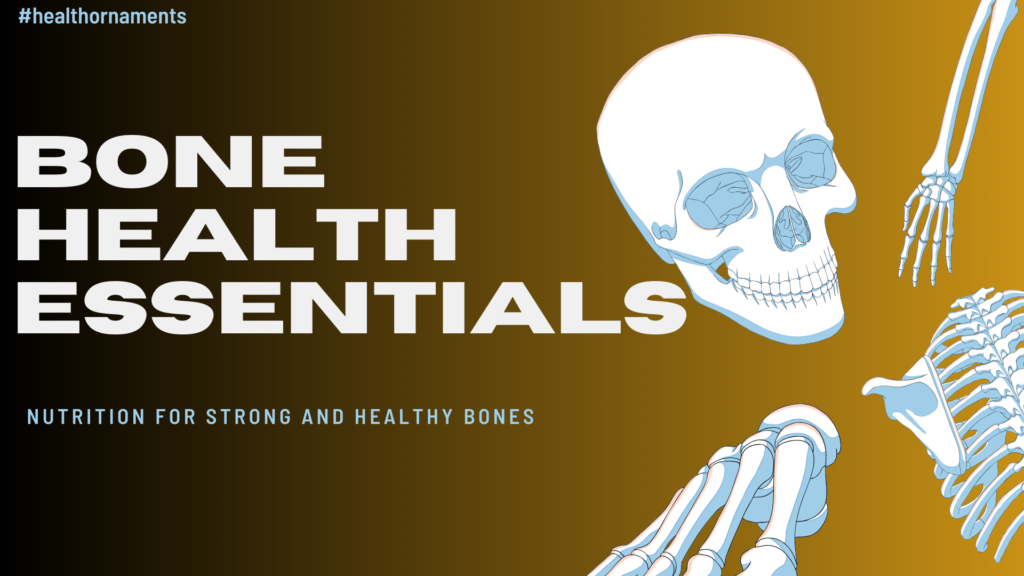Introduction:
Bone Health Essentials: Nutrition for Strong and Healthy Bones: Maintaining strong and healthy bones is crucial for overall well-being, as our skeletal system provides structural support, protects vital organs, and facilitates movement. Achieving optimal bone health involves a combination of factors, with nutrition playing a pivotal role. In this article, we will delve into essential nutrients and dietary practices that promote robust bone health.
1. Calcium: The Foundation of Bone Health
Calcium is a cornerstone nutrient for bone health, as it contributes to the formation and maintenance of bone density. Dairy products, such as milk, cheese, and yogurt, are rich sources of calcium. Additionally, leafy green vegetables like kale and broccoli, as well as fortified foods, can help ensure an adequate intake of this vital mineral.
2. Vitamin D: Facilitating Calcium Absorption
Vitamin D is essential for the absorption of calcium in the body. Sun exposure is a natural source of vitamin D, and dietary sources include fatty fish (salmon, mackerel), egg yolks, and fortified foods like cereals and orange juice. Ensuring sufficient vitamin D levels promotes the utilization of calcium for bone strength.
Read More: Healthy Snacking Hacks: Satisfy Your Cravings without Compromising Nutrition
3. Magnesium: Supporting Bone Structure
Magnesium is another crucial mineral that contributes to bone health by aiding in the conversion of vitamin D into its active form. Nuts, seeds, whole grains, and dark leafy greens are excellent sources of magnesium, promoting the structural integrity of bones.
4. Phosphorus: Collaborating with Calcium
Phosphorus works synergistically with calcium in building and maintaining bone strength. Dairy products, meat, fish, and nuts are rich in phosphorus, ensuring a balanced intake alongside calcium-rich foods for optimal bone health.
5. Vitamin K: Enhancing Bone Density
Vitamin K plays a role in bone metabolism and helps in the synthesis of proteins involved in bone mineralization. Green leafy vegetables, such as spinach and kale, as well as broccoli and Brussels sprouts, are excellent sources of vitamin K.
6. Protein: Building Blocks for Bones
Protein is a crucial component of bone structure, providing the necessary amino acids for bone formation. Include lean meats, poultry, fish, beans, and dairy in your diet to ensure an adequate protein intake for strong and resilient bones.
7. Limiting Excessive Sodium and Caffeine
Excessive sodium and caffeine intake can interfere with calcium absorption and contribute to bone loss. Be mindful of your sodium and caffeine consumption by moderating processed foods, caffeinated beverages, and salty snacks.
Read More: Unlocking the Power of Chia Seeds for Weight Loss: 10 Details and Delicious Recipe
8. Regular Exercise: Complementing Nutritional Efforts
In addition to proper nutrition, weight-bearing exercises, such as walking, jogging, and resistance training, play a crucial role in maintaining bone density. Regular physical activity stimulates bone formation and strengthens the skeletal system.
9. Hydration: Supporting Bone Health
Staying adequately hydrated is often overlooked but is essential for overall health, including bone health. Water helps transport nutrients, including calcium, to the cells, contributing to optimal bone density. Aim to drink an adequate amount of water daily, as dehydration can compromise bone strength.
10. Omega-3 Fatty Acids: Boosting Bone Density
Omega-3 fatty acids, found in fatty fish like salmon, mackerel, and flaxseeds, play a role in reducing inflammation and promoting bone density. Including these sources in your diet can contribute to overall bone health and provide additional benefits for joint function.
11. Fruits and Vegetables: Antioxidant Power
A diet rich in fruits and vegetables provides antioxidants that support bone health. Antioxidants help combat oxidative stress, which can contribute to bone loss. Include a variety of colourful fruits and vegetables to ensure a diverse range of antioxidants.
12. Small, Balanced Meals: Nutrient Absorption
Rather than relying on large meals, consider eating smaller, balanced meals throughout the day. This approach supports efficient nutrient absorption, ensuring that your body receives a steady supply of essential vitamins and minerals for bone health.
Read More: The Power of Superfoods: A Comprehensive Guide to Boosting Your Nutrition
13. Avoiding Excessive Alcohol Consumption
Excessive alcohol intake can negatively impact bone health by interfering with the absorption of calcium and vitamin D. Limit alcohol consumption and be mindful of its potential effects on bone density.
14. Quit Smoking: Aiding Bone Health
Smoking has been linked to lower bone density and an increased risk of fractures. Quitting smoking can contribute to better bone health and reduce the risk of other related health issues.
15. Regular Bone Density Checks: Monitoring Health
Regular bone density assessments, especially for individuals at higher risk of bone-related issues, can provide valuable insights into bone health. Consult with healthcare professionals to determine the appropriate timing and frequency of bone density tests.
Conclusion: Taking Charge of Your Bone Health
In conclusion, strong and healthy bones are the result of a combination of factors, with nutrition playing a central role. By adopting a well-rounded approach that includes a diverse range of nutrients, hydration, regular exercise, and lifestyle adjustments, individuals can actively contribute to the maintenance and improvement of their bone health. Making informed choices and cultivating healthy habits lay the foundation for a robust skeletal system that supports overall well-being throughout life. Remember, it’s never too early or too late to prioritize your bone health.
